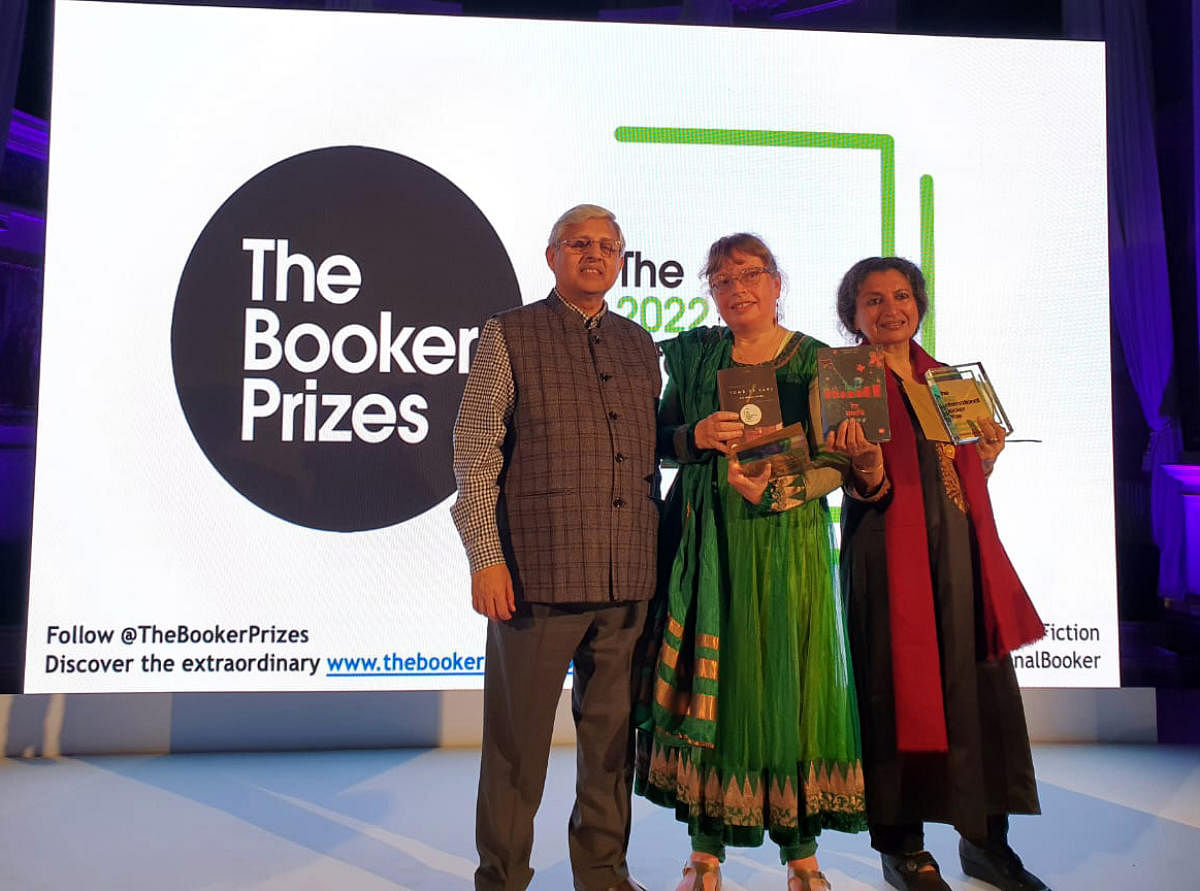
Geetanjali Shree and Daisy Rockwell won the 2022 International Booker Prize for Tomb of Sand, the English translation of the former’s Hindi novel Ret Samadhi. The book also fetched the duo the prestigious Warwick Prize for Women in Translation. It’s also long-listed for the Dublin Literary Award.
There’s no downside of this visibility except ignorance of a crucial aspect of the book by most critics: its much-evident queerness. Both the author and the translator were at this year’s Jaipur Literature Festival and vociferously advocated against the binary understanding of things in general. In a brief interaction, they talk about queerness, translation, and writing marginalised characters.
Geetanjali notes that because “queer people are missing from the consciousness” of many people, they can’t convincingly write them. Remembering her queer artiste friend, she says, “He was very angry that (cishet) writers and intellectuals didn’t consider queer people as a minority community. Or if we ever wondered what queer people’s needs and desires are, and how they’re prejudiced.”
Geetanjali considers it encouraging that LGBT individuals are becoming more visible, but the majority of people continue to ignore even the most obvious aspects of society. She asserts that more LGBT characters ought to be produced because “a writer must not only see but also think about it.” She continues, “While it’s difficult to create queer or Dalit characters since they are outside the scope of one’s life experiences, it isn’t true that others can’t write about their trauma because if it were, writers would only be penning autobiographies. She names various male authors, like Leo Tolstoy (Anna Karenina), Rabindranath Tagore (Aankh Ki Kirkiri), Gustave Flaubert (Madame Bovary), and Sarat Chandra Chattopadhyay, who successfully portrayed women in their works.
When asked how the trans character in Tomb of Sand came to be written, the author explains, “My mother used to go to this public park. She used to be greeted by a trans person every day, and they became friends. Once, when my mother was seated at this puliya, she invited them to take a seat next to her. But they rejected it, arguing that it was wrong and that you came from a reputable family, among other things. My mother insisted though, so they started meeting there frequently to chat. I have no idea what they used to talk about currently. Anyhow, my mum is 96 years old. She wasn’t exposed to any isms, despite the fact that we all have these ideologies and philosophical viewpoints on some problems. For her, it came naturally. That became a source of inspiration for me to pen this character and the relationship you find in the book.”
According to Daisy, who received the seventh Vani Foundation Distinguished Translator Award, translating is a queer phenomenon in and of itself. “I usually find it annoying when individuals ask questions about translation from a heteronormative perspective or regarding what is lost and found, as well as how to keep true to the original work. I hate the lost-and-found binary that translation employs. When I respond to such enquiries, I keep your piece (pointing to this author’s queer reading of Tomb of Sand that was published by Moneycontrol.com) in the back of my mind. I would rather not approach translations in that manner. Translations do, in fact, cross bounds and boundaries, thus they ought to be seen in a queer light because they grow over domains and categories,” she says.
When asked about the writer’s place in society and what they ought to write, Shree responds, “It (should) come from within. A writer needs to cultivate this awareness of untold stories," she continues. "Even if it’s difficult, they must make an effort to inhabit their personas. They could succeed or fail. However, that is the only way to write, therefore they must persevere. However, one shouldn’t instruct a writer on what or when to write. Something that is occurring right now and about which you write right away will (only) be a report. The literary era is (broadly) distinct from the present. I have to wait for the appropriate time to act.”
Gender justice? No easy
answers here...
The Right to Sex (Bloomsbury), written by Amia Srinivasan, the Chichele Professor of Social and Political Theory at All Souls College in Oxford, became a blockbuster right away. In addition to winning the Blackwell’s Book of the Year award, it was shortlisted for the Orwell Prize and the National Book Critics Circle Award.
This collection of six essays takes a nuanced deep dive into queer-feminist discourses on topics like sex and desire, porn consumption, and whether or not to sleep with your students. However, it does so with such ease that it seems the collection was written with the average reader in mind rather than a theorist. Every word in this book is not just sharp, but it also challenges the basic, tokenistic notion of feminism that many of us who live in a time when news is disseminated via a one-minute Instagram video has. Amia responds to a few queries over email in this excerpt that has been edited:
What inspired you to write the Right to Sex?
My students. There was a lot that they learned about the lengthy history of feminist philosophy that was still important and pertinent to them and their lives. I, therefore, wanted to look back on that history and reimagine it for the present. How difficult (or easy) was it for you to write on porn because there’s a reluctance towards the same in popular feminist discourse and politics? Initially, I had no desire to write about pornography. The experience of educating my students about the history of feminist discussions about porn from the 1970s and 1980s made me realise that there were still significant discussions to be had about it as a feminist.
Any feminist work willingly or otherwise misses the queer-feminist aspects. Inevitably many narratives are trans-exclusionary, did you have this concern in mind while working on this project?
Queer women’s struggles have always been at the heart of the global movement for women’s liberation. In my opinion, tarns-exclusionary feminism betrays a feminist heritage that aims to free both men and women from the constraints of binary gender roles. The manner in which tarns-exclusionary feminists in the US and the UK ally themselves with the political right scares me the most because they seem to be forgetting that these so-called allies show little concern for the rights of straight or non-trans women.
When discussing sexual politics, it’s common that the right to sex for individuals with disabilities and autistic people is completely ignored. How should it be closed, and can the fifth or sixth wave of feminism do so?
I believe that feminist movements around the world are gradually improving their understanding of the connections between gender oppression and other forms of oppression, such as ableism, caste, and class-based oppression. We don’t really need a new “wave” of feminism, in my opinion; rather, we need to pay close attention to the demands that poor and working-class women from all over the world have been making for millennia.
I am unsure if you’ve seen Tinder’s microsite Let’s Talk Gender. What do you make out of initiatives like them? Can they really help disseminate correct information because often they’re published by a party that has a vested interest — they’re an enterprise?
I have a very low level of confidence in businesses’ abilities to promote gender justice. Profit is the only thing that truly interests capitalist businesses. Profit-driven motivations have benefited more and more from pandering to sentiments like feminism and anti-racism. Such appeals, however, must only be surface-level since truly feminist and anti-racist politics must be anti-capitalist politics, that is, a politics that is concerned with the economic dominance system that most severely affects the lives of most women and people of colour.
Deccan Herald is on WhatsApp Channels| Join now for Breaking News & Editor's Picks
